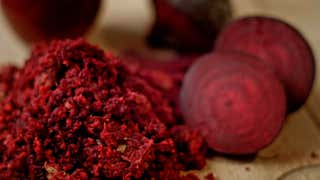
- State transportation agencies spend more than $1 billion every winter trying to keep roads safe.
- Research has shown a connection between road salt and higher salinity in freshwater.
- Beet juice is often seen as an environmentally friendly additive.
Cities across the U.S. are turning to some sweet science to help keep roads clear in the winter.
They’re adding beet juice or beet molasses, byproducts of making sugar, to their salt brine.
In places like Lincoln, Nebraska, beet juice has helped reduce the annual average usage of salt by 20%, according to Tim Byrne, maintenance operations and fleet services manager for Lincoln Transportation and Utilities.
“Sugar is sticky, especially when it's wet,” Byrne told weather.com in an interview. “So, that stickiness, as that is mixed in with the rock salt coming out the tail spinner of the truck, it helps reduce what we call ‘bounce and scatter.’”
That means less salt needs to be used and more of it stays on the roadway, increasing the efficiency and effectiveness of the process, Byrne said.
(MORE: Six Things To Know About Winter Snow Forecasts)
There’s another bonus to beet juice, too.
“The incorporation of that organic by-product serves as a natural corrosion inhibitor,” Byrne said. “By incorporating that into our solutions, (it) makes a brine that is 75% less corrosive than salt itself.”
That helps protect city infrastructure like bridges, as well as any vehicle driving on the city’s 2,600 miles of driving lanes.
The practice of using salt to treat roads dates back to 1938, according to a report by Columbia University. New Hampshire was the first state to try it.
Four years later, more than 5,000 tons of salt was being poured onto U.S. roadways. By 2018, the number was estimated to be more than 20 million.
(MORE: AAA Predicts Second-Busiest Holiday Travel Season On Record)
The use of salt on roads has come under increased scrutiny in recent years. Multiple studies have shown that freshwater in the U.S. is getting saltier, and scientists say winter road treatment is a big reason why.
Beet juice is often looked at as a way to make salt brine more environmentally friendly, although at least one study has questioned its impact on freshwater ecosystems. The practice has grown more popular over the past decade, especially in the Midwest.
State transportation agencies spend more than $1 billion every winter trying to keep roads safe, according to Clear Roads, a national research organization. That doesn’t include the amount spent by individual municipalities like Lincoln.
Using less salt is helping many of them save money.
“We are all working hard at agencies across the country to make sure that we're being responsible with our resources,” Byrne said. “We want traffic to flow, we want people to be safe, but we also want to be responsible in how we're achieving that.”
Weather.com reporter Jan Childs covers breaking news and features related to weather, space, climate change, the environment and everything in between.
The Weather Company’s primary journalistic mission is to report on breaking weather news, the environment and the importance of science to our lives. This story does not necessarily represent the position of our parent company, IBM.
"juice" - Google News
December 16, 2023 at 01:07AM
https://ift.tt/h9qfOvy
Why Cities Turn To Beet Juice To Clear Winter Roads | Weather.com - The Weather Channel
"juice" - Google News
https://ift.tt/DIWSjKm
https://ift.tt/uAeFrk9
Bagikan Berita Ini














0 Response to "Why Cities Turn To Beet Juice To Clear Winter Roads | Weather.com - The Weather Channel"
Post a Comment